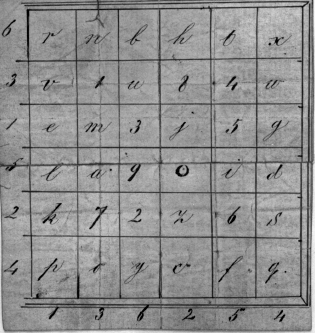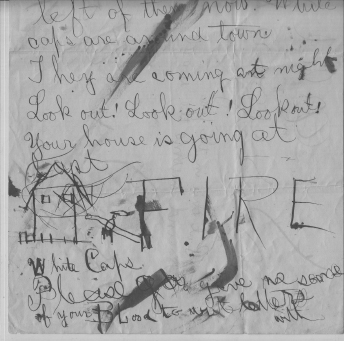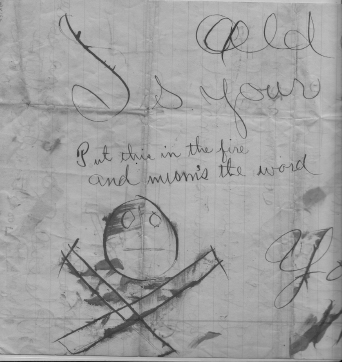
The rebel detectives stood outside the secret room, one with an elbow propped on the dresser that hid its entrance. Elizabeth listened to their meandering chatter, certain they were just testing her, waiting for the moment when she would push the dresser aside, throw open the door, and expose her deed, like the madman in “The Tell-Tale Heart.” She did not breathe again until they began the long walk down the hall.
Downstairs, at her dining table, the detectives ate cookies and drank tea, as if they’d forgotten their main purpose for being there. A few days later the escapees, disguised as Confederates, would make it north via Fort Monroe, just as planned. Her niece Annie thought the whole episode great fun and told the detectives to come back soon, a request Elizabeth suspected they would heed.
One December afternoon a fifteen-year-old girl named Josephine Holmes smiled at the Confederate guards and entered the Libby prison hospital. She passed rows of men suffering from scurvy and diarrhea and fever, some of them dead in their beds. Any patient able to lift his head did so and watched her pass, enjoying the brief and rare sight of a pretty girl, her skirts swishing and braids looped up like lassos. She aimed herself toward the bed of one John R. McCullough, an assistant surgeon for the 1st Wisconsin Infantry who had been captured in Tennessee and sent to the hospital for a minor illness. When she reached his side, she pressed a small bag between his hands. Inside he found a mound of fine Virginia tobacco and a cryptic note: “Would you be free? Then be prepared to act.” Josephine—the daughter of a member of the Richmond Underground—returned the following day and whispered the plan: McCullough would escape by faking his own death.
He wouldn’t be the first prisoner to attempt this ruse. Some “dead” escapees had allowed themselves to be stacked in piles of bodies near the gates and sprinted to freedom after dark. Others were loaded into wagons and hauled off to the burial ground, stealing away once the wagons rambled out of sight. In one infamous case, a prisoner who worked on burial detail was sent out on a job under the watch of several guards. When he dropped the first shovelful of dirt on the body, it yelped in protest—or so the guards, who all fled in horror, thought. The prisoner, who sprinted in the opposite direction, just happened to be a gifted ventriloquist.
A few hours after Josephine’s visit McCullough suffered his sudden “death.” Four of his friends smeared powder on his face to give it an ashen pallor and bound his hands and feet; that way, the guards could hold the ropes when they transported the body, and would be unlikely to notice that it still was warm and had a pulse. McCullough stayed in the dead house, from midday until dusk, lying as still as he could, ignoring the itch of powder in his eyes, the smell of flesh just beginning to turn. At the designated moment his comrades staged a sham fight to distract the guards, and he rose from among the truly dead and ran as fast as he could. One fellow prisoner, Captain Harry Howard, a scout for General Benjamin Butler, followed him to the outside, where they found Josephine waving a white handkerchief.
“Follow me at a distance,” she instructed, and took them to a Union safe house.
They didn’t have much time. Elizabeth coordinated with Samuel Ruth, the Unionist railroad superintendent, who paid $3,000 in Confederate money for a pair of passes out of the city. Female members of the Richmond Underground scurried to the mansion to sew gray uniforms made of rebel blankets. While the women worked, heads bent over their needles and thread, Elizabeth retreated to her study to write a note to General Butler.
Mary Jane had sent reports about the Confederate army’s desperation in the face of dwindling manpower. Rebel troops in both the eastern and the western theaters were abandoning their ranks in growing numbers. The assistant secretary of war estimated that from 50,000 to 100,000 Southern soldiers were absent without leave after the fall of Vicksburg and the defeat at Gettysburg. General Lee wrote long missives to Jefferson Davis, suggesting ways to increase the army’s strength, including revoking draft exemptions. Elizabeth worried that her brother John would be conscripted into the Confederate army, a situation that would put both his life and the Richmond Underground at risk.
At the moment she forced herself to be stoic and practical, focusing not on John’s personal danger but on making alternative arrangements for the Richmond Underground; she had to establish another route to deliver dispatches North. She crafted a letter to Butler, explaining, as obliquely as her direct nature would allow, her desire to help the Union. The general should know that there were many of them, dozens, hundreds—even she couldn’t recite all of their names or place all of their faces—living in the Confederate capital, citizens who had become traitors with the firing of shots and the stroke of a pen. He should not take her word for it, she stressed, but listen to the testimony of John McCullough, the escaped prisoner, the man bearing this letter. He should consult someone else, too, a mutual friend: Commander Charles O. Boutelle, a Massachusetts native and topographical engineer with the US Coast Survey Office in Washington. As an accompaniment to the letter she prepared a bouquet of geraniums and winter honeysuckle; surely even “The Beast” would appreciate something of beauty.
Ten days later, after rebel guards gave up their search, McCullough and Howard, disguised as Confederates, emerged from hiding and began hiking through the lines to the Potomac River, heading for the provost marshal’s office in Washington. The Southern press finally caught on. “The ‘dead’ Yankee has arrived in the North, in company with a live Yankee,” reported the Richmond Examiner. “The ‘Union people’ of Richmond, who made the suits of clothing and obtained passports for McCullough and Howard, will rejoice to learn of their successful journey.” The article concluded with a question that seemed aimed directly at Elizabeth: “By the way, are not some of them known to the detectives?”
The Union’s espionage operations had undergone significant change since the days of General McClellan and Allan Pinkerton. The Secret Service under McClellan’s successor, Ambrose Burnside, also failed to connect with local Unionists in relevant towns and cities, a misstep that contributed to the disastrous Federal defeat during the Fredericksburg campaign of the previous winter. Burnside’s replacement, Joseph Hooker, was the first Union commander to realize the liabilities of the army’s informal, decentralized approach, whereby each general was left to his own devices, expected to run his personal espionage operations as he chose without any oversight or overlapping of information or sources (little wonder, then, that Butler hadn’t yet heard of Elizabeth or the Richmond Underground).
Grasping the advantage of having a centralized, cohesive authority, Hooker created a Bureau of Military Information in early 1863. Its chief, a young lawyer and colonel named George H. Sharpe, merged Pinkerton’s spying and interrogation functions with reports gleaned from other types of intelligence gathering activities, such as cavalry reconnaissance, scouting, and interception of Confederate flag messages. It was a groundbreaking achievement: for the first time, the army commander had as comprehensive a picture of the enemy’s situation as sources allowed. As General George Meade, Hooker’s successor, prepared to meet rebel forces at Gettysburg, fourteen locally organized groups of citizen spies aided him.
When McCullough delivered Elizabeth’s letter (the bouquet, sadly, had wilted en route), Butler envisioned tapping into a similar spy network in Richmond. He did as Elizabeth suggested and contacted their mutual friend.
“My Dear Boutelle,” Butler wrote, “You will find enclosed a letter from a dear friend of yours in Richmond. I am informed by the bearer that Miss Van Lieu [sic] is a true Union woman as true as steel. She sent me a bouquet, so says the letter carrier.” Butler explained that he needed a knowledgeable correspondent in Richmond, and wanted to confirm that Elizabeth would be up to the job. “I can place my first and only letter in her hands for her directions, but I also place the man’s life in her hands who delivers the letter. Is it safe to do so?” He could entice Elizabeth with monetary rewards, Butler concluded, but “from what I hear of her I should prefer not to do it, as I think she would be actuated to do what she does by patriotic motives alone.”
Boutelle told Butler to trust Elizabeth and proceed.
Back in Richmond, Elizabeth waited—for what, exactly, she wasn’t sure: the delivery of a book with doctored sentences, the clandestine drop of a letter by her feet, or, if McCullough had been caught along the way, the knock of Confederate detectives at her door. The response came, finally, in the form of William S. Rowley, her most trusted spy, pulling his carriage up to the mansion, cool and composed even in his excitement. Alongside him sat Captain Howard, the scout and escaped prisoner, who had risked his life to cross the lines back into Richmond. Victory: Boutelle had vouched for her and Butler had listened.
The three of them huddled close in her study, the fire spitting at their backs. She read Butler’s dispatch, lips moving noiselessly with each word:
My Dear Aunt:
I suppose you have been wondering why your nephew has not written before, but we have been uncertain whether we should be able to send a letter. The Yankees steal all the letters that have any money in them through Flag of Truce, so that we thought we would wait until we got a safe chance.
I am glad to write that Mary is a great deal better. Her cough has improved, and the doctor has some hope. Your niece Jennie sends love, and says she wishes you could come north, but I suppose that is impossible. Mother tells me to say that she has given up all hopes of meeting you, until we all meet in heaven.
Yours Affectionately, James ap Jones
From his pocket Captain Howard retrieved a vial of tannic acid, which he tipped and spread across the page. He motioned for Elizabeth to move it closer to the fire. The heat lapped at her fingertips. Silently she coaxed the alternative letters to appear, watching the strokes of ink stretch and curve and morph into an entirely different message:
My Dear Miss:
The doctor who came through and spoke to me said that you would be willing to aid the Union cause by furnishing me with information if I would devise a means. You can write through Flag of Truce, directed to James ap Jones, Norfolk, the letter being written as this is, and with the means furnished by the messenger who brings this. I cannot refrain from saying to you, although personally unknown, how much I am rejoiced to hear of the strong feelings for the Union which exists in your own breast and among some of the ladies of Richmond. I have the honor to be,
Very respectfully, Your obedient servant
Captain Howard produced another vial filled with what looked like water, an odorless and colorless liquid—“S.S. Fluid,” he called it. She was to use it for all future correspondence. He dipped his finger into a bottle of milk and smeared it across the invisible fluid, demonstrating how it turned black. Next he pressed into her hand a small square piece of paper featuring six rows and six columns of letters, rimmed by a right angle of numbers—a cipher based on the Polybius checkerboard. She kept the key to the cipher in the case of her watch, which she wore at all times, even to sleep. The enemy would find the key only if she weren’t alive to prevent it.

Elizabeth Van Lew’s cipher.
(New York Public Library)
Sometime after Butler made contact Elizabeth received another letter, this one delivered through the mail. The words lurched across the page in a deeply pressed and erratic script, as if scrawled by someone very young or very old. She filed it away, evidence for a crime yet to be committed: “They are coming at night. Look out! Look out! Look out! Your house is going. FIRE. Old Maid, is your house insured? Please give us some of your blood to write with.”
It was signed, “White Caps,” and concluded with a crude rendering of a skull and crossbones.


Fragments of a threatening note from the “White Caps” to Elizabeth Van Lew.
(New York Public Library)